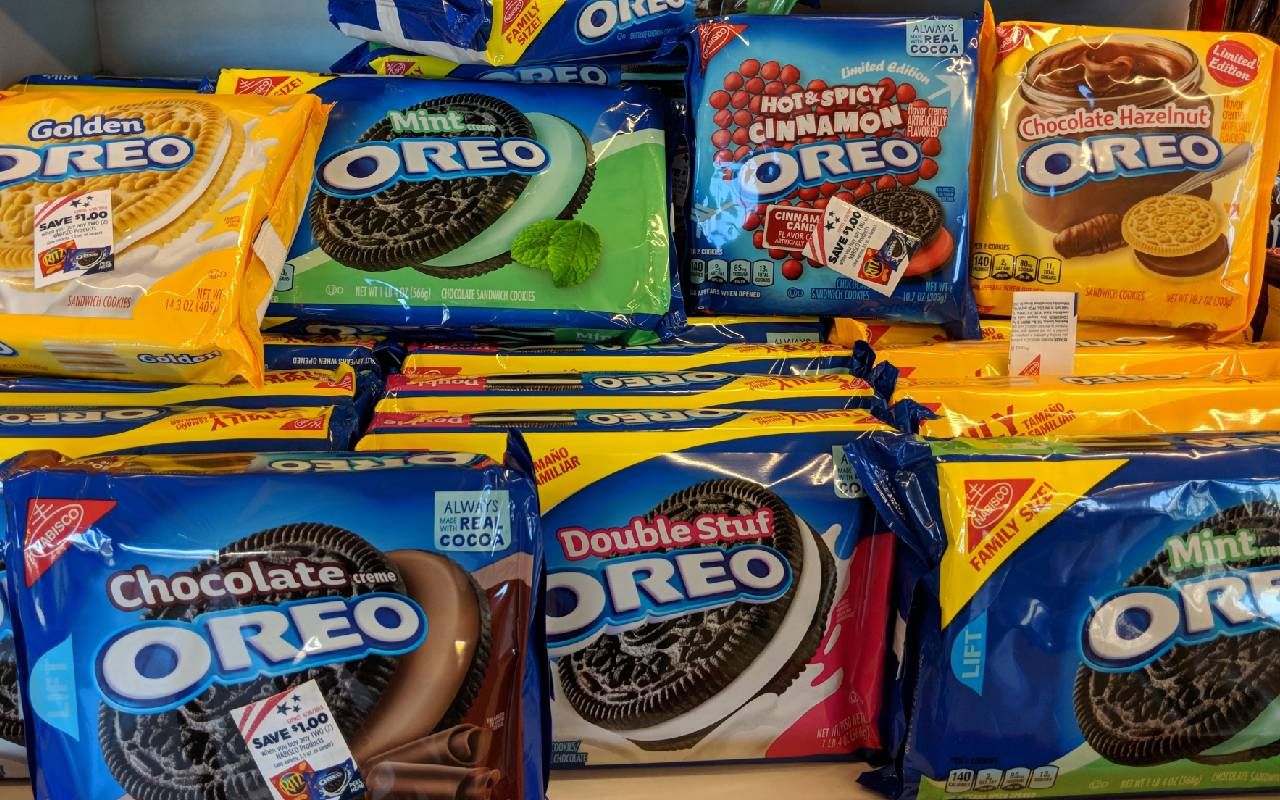Drowning in Decisions
The surfeit of options we face every day can cause ‘analysis paralysis’
I've taken to calling it The Oreo Dilemma.

A bit of backstory: For some logical-to-me (but eccentric-to-the-rest-of-the-world) reason, I started taking pictures of Oreo displays at supermarkets a few years back when I realized that Oreo cookie options went way beyond regular and "Double Stuf."
My photographic inventory now stands at 34 varieties, including Hot & Spicy Cinnamon, Red Velvet, Chocolate Hazelnut, Caramel Coconut, Cherry Cola, Piña Colada, Rocky Road and "Firework" (not sure what flavor that last one might be).
Turns out I am such an amateur.
An Ocean of Options
My reconnaissance reveals only the very tip of a veritable Oreo iceberg. Online sources tell me that the folks at Nabisco have dreamed up more than 200 Oreo varieties over the years. It's not just Oreos, of course. Doritos have come in 198 flavors over the years; Cheetos 133; and M&Ms 61.
"The more complex the decision, the greater the number of options, and the more voluminous the information, the worse our decision-making becomes."
And our supermarket shelves have nothing on Amazon. This morning I had the occasion to shop for a "cat toy plush ball launcher." (Don't ask.) My search query resulted in almost 400 options. What?!?
You might say, "What are you complaining about? You have choices! It's called freedom! Liberty! It's American!"
But nearly all of us have experienced the pernicious effects of having just too many options. Psychologists call it "choice overload" and "analysis paralysis." When faced with a plethora of possibilities, we may throw up our hands and make bad decisions — or no decision at all. That may be no big deal if we are buying cookies but can be life-changing if we're selecting a retirement plan or a health insurance policy. And we could harm our mental health in the process.
What's Going on Here?
Let's go back to the beginning: Americans are, first and foremost, rugged individualists. We want the freedom to choose for ourselves. It's kind of our defining quality, even our origin story — you know, life, liberty and the pursuit of the best deal on Black Friday.
"When there is too much choice, we get paralyzed, not 'liberated.' "
Barry Schwartz, author of the seminal book on the topic — "The Paradox of Choice: Why More Is Less" — says the belief that an abundance of choice is innately positive has become "the official dogma of all Western industrialized societies." From the get-go, we Americans embraced "The Wealth of Nations," Adam Smith's philosophical treatise extolling the magic of free markets. (Coincidentally, the book was published in 1776.)
But when Smith wrote about the "invisible hand" of free-market capitalism working to ensure the best possible outcome, he wasn't flummoxed by 34 (or 200!) varieties of Oreos. Or the more than 8,000 mutual funds available in the U.S. Or the 700 typefaces on Microsoft Word. (Trust me: go with Cambria.)
"The paradox is this: We think that more choice means more freedom," explains Schwartz, "but what my book shows is that when there is too much choice, we get paralyzed, not 'liberated.' "
How Much Choice Is Enough?
Certainly, when we have no choice, "life is almost unbearable," Schwartz notes in his book. Having a certain amount of choice can be a powerful and positive thing, he adds. But as our options increase, "the negatives escalate until we become overloaded."
"At this point," he asserts, "choice no longer liberates, but debilitates."
This dilemma can be better understood by looking at how we do — or don't — make our decisions.
In his book, Schwartz outlines an optimal decision-making process including the following steps: 1) know your goals and criteria; 2) gather information (options available); 3) evaluate the options vis-à-vis your goals and criteria.
But few of us actually follow these steps. It turns out that humans kinda stink at decision-making. Schwartz says that even under auspicious circumstances — with enough time and a manageable number of options — we are "very imperfect decision makers." We have difficulty defining what we want and an even more arduous time gathering and evaluating the options.
When we add in a nearly endless array of choices and decision points, our imperfect decision-making capabilities actually turn on us. "The more complex the decision, the greater the number of options, and the more voluminous the information, the worse our decision-making becomes," says Schwartz.
An Entertainment Avalanche
And we are — quite simply — drowning in choices.
Examples can be found everywhere, and most are pretty drastic when viewed historically. Here's one: I grew up in the 1950s and '60s. My family felt very fortunate to own a black-and-white console television. We built an altar to it in our living room and, since I was the youngest of seven, I rarely got a vote on which of the three stations to watch. I was just happy to be in the room.
Enter the American Home Entertainment Experience today. As of July 2023, there were 6,621 movies, series and specials — on Netflix alone. And, by one calculation, we currently have over 200 other streaming services to choose from.
Myriad challenges — beyond the Oreo universe — await us at the grocery store. Indeed, Walmart Supercenters stock an average of 142,000 different products.
Enter the Internet, "a warehouse with infinite floor space," according to Schwartz. Surely the queen of confusion is Amazon. It's estimated that there are over 600 million products listed on Amazon alone.
The Negatives of Choice Overload
It's no wonder that our decision-making capabilities are abysmal. Or that our souls are a bit battered.
According to Schwartz, there are three areas where problems arise due to this deluge of options: 1) paralysis (we're so overwhelmed we fail to make any decision); 2) we make objectively worse decisions (the cognitive burden of evaluating so many options undermines decision-making); and 3) we make subjectively worse decisions (with more regret and less satisfaction).
"The more decisions we face, and the more options we encounter, the greater the fatigue. This leads to errors and saps our energy to do other things."
In his book, Schwartz cites research that these negatives lead, for many, to less happiness and optimism, more enervation, indecision, anxiety and, ultimately, depression.
It's the cumulative effect of the many, many decisions we need to make every day that does us in, says Schwartz. He uses the late economist Fred Hirsch's description of this phenomenon: "the tyranny of small decisions."
"It takes mental work to make decisions," explains Schwartz. "The more decisions we face, and the more options we encounter, the greater the fatigue. This leads to errors and saps our energy to do other things."
Schwartz' book was published 20 years ago. Today, he says, overwhelming choice is much more problematic. "In my view, the internet has turned a problem into a nightmare," warns Schwartz. Along with the urge to acquire a plethora of material goods, the World Wide Web delivers a compulsive pursuit of perfection and a phenomenon called fear of missing out, or FOMO — all on steroids.
How to Overcome Decision Distress
What's the answer? Don't count on Microsoft to start limiting your typeface selection to Times New Roman or Calibri. Toffee Crunch Creme Oreos and Flamin' Hot Nacho Doritos are unlikely to disappear from grocery shelves. And we won't be going back to black-and-white TVs with three channels any time soon.
But that doesn't mean you don't have, er, choices. Here are a few tactics recommended by Schwartz:
1. Choose when to choose. Simply opt out of some decision-making.
In a 2012 interview in Vanity Fair, President Barack Obama indicated that he has adopted this choice-overload strategy. He gave his wardrobe as one example. "You'll see I wear only gray or blue suits," he said. "I'm trying to pare down decisions. I don't want to make decisions about what I'm eating or wearing. Because I have too many other decisions to make."
2. Seek "good enough" rather than "the best" when making decisions.
In his book, Schwartz calls this approach being a "satisficer" (a term coined by the economist Herb Simon versus a "maximizer." Maximizers strive to always make the best decision, while satisficers settle for "good enough." They still have standards, but when they find an item that meets their criteria, they stop. (Ultimately, satisficers are happier; maximizers are more likely to be clinically depressed.)
3. Regret less.
Schwartz tells the story of a friend who had been ruing — for four decades — his failure to attend an Ivy League college. In the words of Elsa, heroine of the animated movie "Frozen," "let it go."
4. Take advantage of "habits of choice."
Two words here: Miracle Whip — my default salad dressing. It's what Mom used and it's "good enough" for me.
5. Curtail social comparisons.
Quit trying to "keep up with the Joneses." "Focus on what makes you happy and what gives meaning to your life," says Schwartz.
6. Cultivate gratitude.
Schwartz is also a big fan of developing an "attitude of gratitude." It's really the opposite of making those social comparisons, focusing, instead, on the positives in your life. Schwartz recommends keeping a gratitude journal.
"You may find yourself feeling better and better about your life as it is," he says, "and less and less driven to find the 'new and improved' products and activities that will enhance it."


